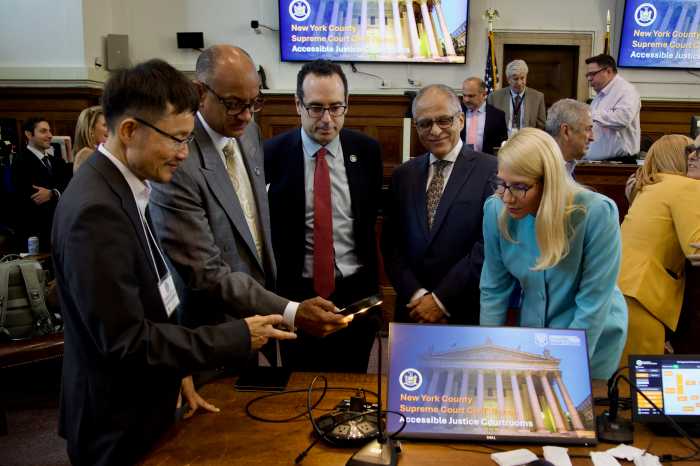The Levittown Board of Education held a special meeting at the Levittown Memorial Education Center on June 22 for the purpose of discussing a petition protesting its recent decision to alter the district’s student transportation eligibility policy.
During the budget vote held on May 19, a referendum (Proposition #2) was presented to Levittown residents that would grant the board the authority to increase the minimum distance, from one-half mile to three-quarters of a mile, that students would be required to live from their schools in order to be eligible for bus transportation. By modifying the transportation eligibility requirements, the board would make fewer children eligible for bus services and save the district an estimated $800,000 per year in transportation costs. Although the referendum was passed along with the budget, district residents have since compiled a petition with more than 900 signatures requesting that the board not follow through on enacting this measure and instead arrange a special re-vote on the referendum prior to the upcoming school year.
The altering of the transportation eligibility criteria is one of a series of money-saving measures the board has considered this year as part of a concerted effort to lower the district’s expenses. According to Superintendent Dr. Herman Sirois, the failure of the state government to increase aid to the district in the last few years, combined with the onset of the current economic recession, has forced the board to implement an array of budget cuts. These cuts include reductions in various programs, services, and staffs throughout the district.
The response to the referendum vote was the first of two major controversies that have dogged the board in recent weeks. The second was the results of a state audit released on June 15, which outlined a number of poor and even unlawful budgeting practices by the district in 2006 and 2007, such as over-spending on various projects and over-investing in reserve funds, which ultimately resulted in the district accumulating a $6 million operating budget deficit. Dr. Sirois had already publicly admitted to the district having a multi-million dollar deficit in 2007, which he attributed mainly to the failure of a particular business administrator to calculate expenses for roughly 25 district employees. That administrator, Dr. Sirois had said, had already been forced to leave the district because of questions regarding the quality of his work. Although Dr. Sirois has insisted that the 2007 deficit has since been covered by the district’s reserve fund and “had no adverse affect on the taxpayers of the Levittown School District,” many residents have continued to raise questions and even express outrage over the findings of the audit.
“I now question whether our children are being made to pay for mistakes due to the mismanagement of our district,” said Jane Shortell, the mother of an East Broadway second grader, in regard to the recent budget cuts. Shortell, whose daughter will likely lose her transportation eligibility as a result of the referendum, has been one of the most vocal critics of the proposed reduction in bus services. Prior to the budget vote, she had addressed the board at a meeting on May 12 and pleaded with its members not to include the referendum on the voting ballot. After the referendum passed, she lamented, “I have no idea how I will safely get my daughter to and from school. My husband and I both work. Our jobs require us to be at our offices well before school starts.” She said many of her neighbors with children were in similar predicaments, which makes the prospect of finding someone that her daughter can carpool to school with highly unlikely. As for the possibility of her daughter walking to school, she said, “To get to East Broadway, my daughter will have to walk along Seaman Neck Road, an extremely busy and dangerous road, cross over Southern State Parkway, pass a sump, a truck lot, and several unfenced wooded areas, crossing three streets before reaching East Broadway. That is not something she can do alone.” She insisted, “Children that age simply do not have the judgment or spatial awareness necessary to safely cross the street on their own.”
According to Shortell, the estimated savings gained from the passing of the referendum appear much less lucrative when broken down.
“There are 15,114 households in Levittown school district,” she said. “Dividing $800,000 by that number leaves an average savings per household of just $52.93 per year. I cannot believe that any resident of our community really thinks that my daughter’s safety and the safety of all our other children is worth so very little.”
Shortell also criticized the wording of the referendum when it was featured on the ballot, claiming it was poorly, even deceptively worded – a complaint echoed by several other residents who addressed the board at a meeting on June 10.
“Some [people] were confused about the language,” she claimed. “Some did not understand that you could vote ‘Yes’ to the budget and ‘No’ to the proposition. It was not at all clear that the $800,000 in proposed savings was already allocated in the budget they were ready to vote ‘Yes’ on.” She even went so far as to say, “I question whether the wording of the proposition was legal.”
At the June 10 meeting, the board had voted to schedule a follow-up session on June 16 to consider the petition it had been given concerning the referendum. But when the evening of June 16 came – which, as it turned out, was the day after the results of the state audit were released – more than half the board members failed to appear at the meeting. As a result, the June 22 meeting was then scheduled.
As is customary when attendance exceeds expectations, the meeting on June 22 was held in the center’s auditorium rather than the standard conference room.
The meeting began with a Public Be Heard session, in which audience members who had signed up in advance were each granted an opportunity to address the board. Although the recent budget cuts had already resulted in heated discussions at previous meetings, the deliberations of June 22 were by far the most impassioned and unruly of any thus far this year. The tone of the meeting was set by the very first speaker, Gary Fisch of the Levittown Community Council, who called on both Dr. Sirois and Board President Gina Interdonato to resign from their respective positions. His brazen demand received a thundering ovation from the audience. He also listed the names of the board members who were serving at the time that the 2007 deficit was accrued.
“These were the people who were on the board when all of these shenanigans were allowed to happen,” he said. Speaking as if addressing those individuals, he then said, “You have taken our money, and you haven’t given the students of this district what they should be getting,”; he added, “You should have been ashamed of yourselves.” He also claimed, “The $800,000 never even would have come up if it hadn’t been for the tens of millions of dollars that the previous board squirreled away in this district.”
In addition, Fisch, a former board member himself, criticized Dr. Sirois for blaming the 2007 deficit on the work of a former administrator and attributing the recent necessity of budget cuts to a lack of state aid. He also disputed Dr. Sirois’ statement that the administrator allegedly responsible for the previous deficit had been forced to leave the district because of the quality of his work, claiming instead that he left over an issue concerning a paycheck.
The board rebuked Fisch’s speech with the same assertiveness he had shown.
“First of all, you come up here and complain about Dr. Sirois,” Interdonato said, “[but] you wrote Dr. Sirois’ last contract, so what are you complaining about?” She insisted, “When any issue came about, it was dealt with immediately. You can say what you want about why our last business person left, but you did not sit behind closed doors… so you don’t know why he left. He’s gone; every single thing on that audit – which we asked to have done – has been corrected. So let’s move on with the business of educating our children. Enough is enough with the trashing of everybody.”
Nevertheless, speakers continued to refer to the 2007 deficit and the results of the state audit in their speeches.
“So this is where we save our money: making the little kids walk to school,” one speaker sniped. He accused the board of placing the burden of previous administrative mistakes “on the backs of our children; on the backs of the 6- and 7- and 8-year-olds.” While he conceded that many parents had been forced to walk similarly long distances when they were children, he noted, “Times were different.” He pointed out that the projected $800,000 in savings was only “one-half of one percent” of the district’s roughly $183 million budget, and asked, “Why do we have to address one-half of one percent of a huge budget on the backs of these children?”
Most of the speakers that addressed the board voiced their support of the petition to hold a re-vote on the referendum. Many of them reiterated arguments that had been made by speakers at previous meetings, although this time with a much greater sense of passion and urgency. They continued to criticize the wording of the referendum on the voting ballot, claiming it could too easily have been misconstrued that a vote of “Yes” for the referendum would be, contrary to the truth, a vote to retain the transportation eligibility requirements as is. They described the many potential dangers children would have to face if forced to walk three-quarters of a mile to and from school, which included crossing high-traffic roads, passing by or through vacant lots, and perhaps even coming within the vicinity of the homes of registered sex offenders. They also pointed out that those parents who would be fortunate enough to be able to drive their children to and from school would do so, which would significantly increase traffic in and around the schools – not only creating havoc for drivers in conditions that were already difficult to begin with, but also further increasing the dangers for those children walking to and from school. In addition, they claimed, any tax dollar savings those parents would gain by the reduction in bus services would be offset by the cost of the gasoline used in driving their children to and from school, as well as the wages they might lose for any time that they might have to take off from their jobs in order to be able to drive their children.
One woman asked if additional staff was going to be added at schools during morning and afternoon hours to supervise the increased traffic or if schools would be permitted to open earlier in the morning, so that parents would have the option of dropping their children off at an earlier time and perhaps avoid the hectic traffic conditions around the schools. The board, however, said that there were no plans to increase supervision for children or open the schools any earlier.
Another speaker chastised the board for continuing to raise taxes while simultaneously cutting back services to the students. He also claimed to have a petition of roughly 1,100 signatures of residents who complained that they had not received the letters that the district was supposed to have mailed out to residents informing them about the referendum prior to the budget vote. He asked the board what the reason was that so many people had failed to receive proper notification, and what action the board would take in response to this. Dr. Sirois said only that he had been scheduled to meet with post office officials to address the matter, but that meeting had been postponed.
In her speech to the board, Jane Shortell questioned whether $800,000 was an accurate estimation of the expected savings. She also pointed out that other expenses could arise as a result of the referendum that would offset any potential savings: for example, she inquired as to the number of children with disabilities and other medical issues that would lose access to standard bus services and would now have to be individually transported to their schools at additional cost to the district. She also suggested that the board itself believed that the passing of the referendum was likely a “mistake” resulting from the deceptive wording of the proposition on the ballot, and that it would be voted down if the residents were given the opportunity to re-vote on it – and that, she claimed, was the underlying reason that the board was reluctant to arrange a re-vote.
Not all speakers were in favor of a re-vote on the referendum, however.
One man dismissed the notion that children affected by the referendum would be left with no option other than to walk three-quarters of a mile to and from school.
“I don’t believe for one minute that a parent would allow this to happen,” he said.
Several speakers also criticized those members of the audience who were currently protesting the referendum, but had failed to appear at meetings prior to the vote and voice their opposition to it then.
Former board member John Garvey, who had served as a trustee until choosing not to run for re-election just this May, was among the assembly and also addressed the board. He sympathized with the board, noting that it had a very difficult decision to make. He then pointed out that the petition to arrange a re-vote featured significantly less signatures than the number of favorable votes that the referendum had received, and claimed that if the board chose to reconsider a proposition that had been decisively approved by the public, it would set a very problematic precedent.
“You have to think about the consequences of not just this vote, but of every other vote that goes forward,” he said, claiming that a decision to allow a re-vote would open the way for residents to petition the results of any public vote, including the election of board members. “Once the votes are taken, you have to go by that,” he said. He punctuated his speech by saying, “There are probably a lot of people who signed that petition who didn’t even bother to vote.”
The crowd responded very unfavorably to Garvey’s words. Several audience members interrupted his speech to voice their disagreement.
Following the Public Be Heard session, Interdonato took a few moments to explain the board’s predicament to the audience.
“Part of our job is to strike a real balance between the money that it costs the taxpayers to support the school district,” she said, “but the other side of it is the education of our children; and every single person that runs for the board takes both of those aspects very, very seriously.” To illustrate her own dedication to the district, she said, “For more than 20 years, I have dedicated myself to this community; for the last eight-going-on-nine, I’ve been a board member.”
The board members then took turns weighing in with their views on the matters at hand.
Trustee James P. Ward pointed out that the state only required districts to maintain bus services for students that lived at least two miles from their schools. He also pointed out that a three-quarters of a mile minimum requirement had already been used by the Levittown district for some time, and that it was only relatively recently that it had been changed to one half-mile. He then asked rhetorically, is it wrong to ask a child to walk three-quarters of a mile? Although he had intended to answer his own question by saying, “I don’t know,” the crowd answered first with a resounding, “No!”
Ward also inquired as to why so many residents protesting the referendum now had failed to do so prior to the budget vote.
“From March 30, when the board adopted that budget, until sometime in early May,” he explained, “I didn’t receive one telephone call, one letter, or any indication from anybody in this community concerning buses. I did hear from other folks who were concerned about the loss of the nine period day, advanced placement courses, college placement courses, and a whole host of other academic programs that the board worked overtime to save.”
Another board member noted that he had had reservations about the referendum prior to the vote, but said he would not interfere with it now that it had received public approval. He also claimed to have received numerous phone calls and e-mails from residents who had voted for the referendum pleading with him to uphold the will of the voters.
“I feel for every single one of you,” he told the audience, but said, “I am not turning my back on 2,000 cast votes.”
Board Secretary Michael Pappas echoed a similar sentiment, reiterating the words that John Garvey had used in his speech to the board, “A vote is a vote.” He also said, “I’m not going to support a petition that doesn’t protect all of our children.” He explained that the challenges that students and parents will have to face as a result of the referendum are no different than the ones that the residents who live ½ mile or less from their schools have already been facing. He asked, why should exceptions be made only for the residents that live between one half-mile and three-quarters of a mile from their schools? He then asked the assembly for its thoughts on a hypothetical proposition in which the district would actually spend more taxpayer money – an additional $150 per household, he estimated – to expand bus services to include all children in the district. When the audience responded with a round of applause, he pointed out that a great many of the complaints the board had received at previous meetings were in regard to rising school taxes.
Although Interdonato expressed a similar reluctance to retract a proposition that had received public approval, she also said, “I’m very concerned about the confusion with the way this was written,” referring to the criticism of the wording of the referendum on the voting ballot.
As the crowd listened to the board speak, it became increasingly restless and disruptive. Audience members began to heckle and jeer board members whose views contrasted with their own, and they repeatedly interrupted board members’ speeches to demand opportunities to address the board’s comments. The crowd’s agitation was further exacerbated by frequent malfunctions of the room’s audio system which often made the board members very difficult to hear as they spoke. At times, the assembly became so unruly that Interdonato furiously banged her gavel on the table in front of her and even threatened to promptly end the meeting without even considering the petition.
Tensions finally came to a head when the issue of board members having failed to appear at the June 16 meeting came under discussion. As the board tried to justify the absence of members on the grounds that the meeting was impromptu and unscheduled, an audience member stood up and shouted at the top of his lungs, “This is elitism to the ‘nth degree!” Referring to the June 16 meeting, he told the board, “People were here, and they expected you to be there!”
One of the board members calmly told the man, “You’re welcome to run for the board next time.”
“Maybe I will!” the man shouted back, and then stormed out of the auditorium. The rest of the crowd applauded him as he left.
The assembly was briefly pacified when the board finally agreed to accept the petition and consider what course of action to take in regard to it. However, the crowd’s satisfaction gradually turned to agitation and then disgust as several board members appeared not to understand the options that were available to them and had to have them explained to them multiple times. Eventually, after much discussion among its members – and much heckling from the audience – the board voted on whether or not to set up a special re-vote. By a vote of 4-3, the board voted against arranging the re-vote.
When it was announced that the petition had been “defeated,” a roar of protest erupted from the assembly. A round of angry catcalls such as “How dare you!” and “You’re all useless!” were hurled at the board. The crowd’s vociferous outrage, however, was contrasted sharply by the calm and composed demeanors of all the board members as they remained seated at their table. When one audience member cried out, “You’re going to be gone next year!,” Interdonato calmly informed him that only two of the board members would be up for re-election at that time.
After most of the audience had drifted outside, where many of its members gathered to discuss the night’s proceedings amongst each other, the board continued with the meeting on into the night, discussing various administrative matters. It voted to transfer money out of reserve funds to use as part of the district’s operating budget. It also discussed the future of the Developmental Learning Center (DLC) at Summit Lane Elementary School, which features programs that provide special education to developmentally disabled children. As part of the recent budget cuts, the board has chosen to downsize the center’s programs. The board has also elected to stop allowing non-district children to enroll in the programs, although non-district children already enrolled in them will currently be allowed to remain and continue receiving their education.
































